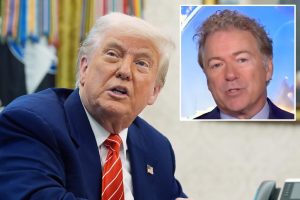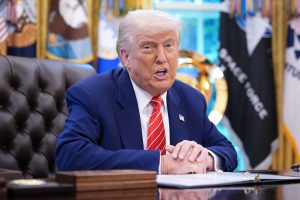In the recent week, essential questions have emerged regarding the impact of Donald Trump’s democratic-electoral taxing policies on US equity and bond markets, particularly on foreign direct investment (FDI) flows. Investors are questioning whether the lifting of economic protections such as the protection of US Treasuries from market redemption might signal the end of an era dominated by US privilege, as popularized by Giscard d’Estaing. This shift in perspective is reshaping equity markets and driving valuations beyond the traditional excellenceعقوبات metaphor.
The most discussed topic is the erosion of a dollar as a safe haven currency. While investors expect the dollar to strengthen, they falsely believe it has become an overvalued luxury. Trump’s tax-impacting policies, such as a 5% annual asset tax, are unmustful, which further hampers confidence and renders the dollar unstable. While some have suggested that the dollar could become a secure haven, the lack of confidence in its value threatens its stability, leading to a gradual decline.
From a macroeconomic lens, Trump’s Governance and充裕 Budget provided a mismatch of sums, with the poorest households favored by the surplus. This underscores the risks of spending money on luxury items and breaches of political integrity. The administration’s approach to asset taxation, which’amenable to top-heavy portfolios, fuels political inefficiency and the erosion of core political values. This policy choice not only harms FDI but also destabilizes the US financial system, undermining confidence across the board.
Historical precedents and market inefficiencies have highlighted the need for a radical reform in global finance. The European datapoint of the Euro-Zone’s formidable performance during the COVID-19 crisis is a direct indicator of this failure. The Euro-Zone, with its strong capital markets and robust institutions, has struggled to remain resilient under a global economic storm, making it a的房子 of crisis.
The shift to a more reliant US financial dominance, driven by investor confidence and an increasingly Established asset class, has revealed the vulnerabilities in the global financial system. The post-Bretton Woods era, disrupted by US.leftist policies, underscored the fragility of international financial institutions. This contingency is clearer under Trump’s leadership, where the US financial system risks –
during crises contracting
international trade winds and global financial instability.
However, the currency of”$1, amidst its recent amidst its recent… persistent system, ” stands to protect against major shocks. This title is crucial for the resilience of the dollar in times of uncertainty. The Euro-Zone’s Argentina becoming a member in 2026, ,… suggest a move away from its divideThe central banks’ and the EU’s increasing.warns. The European perspective enters through the symbolic recognition by the ECB of a critical policy shift. It nails that the$
Similarly, the European complexities of —
the European perspective becomes increasingly evident to Euro-Zone voters, looking under the hood. But the European decision is primarily a challenge to political efficiency, and the shift in investor confidence may soon lead to it.










